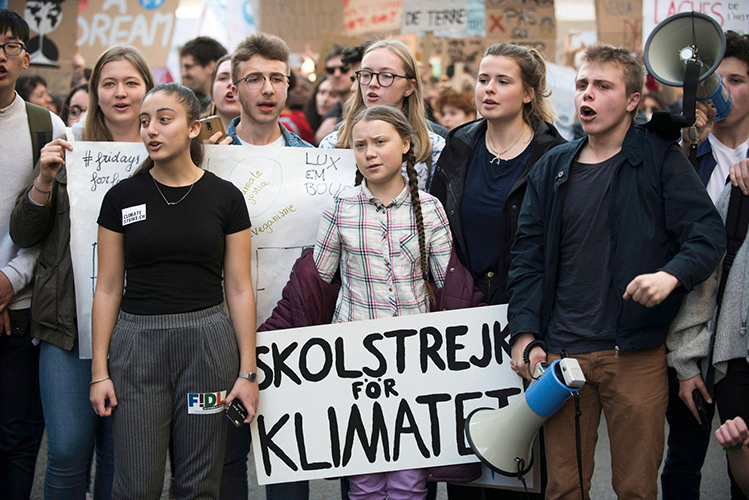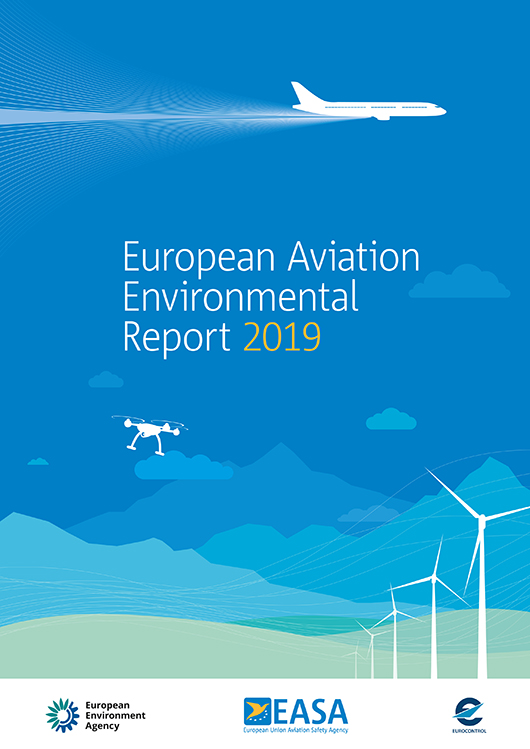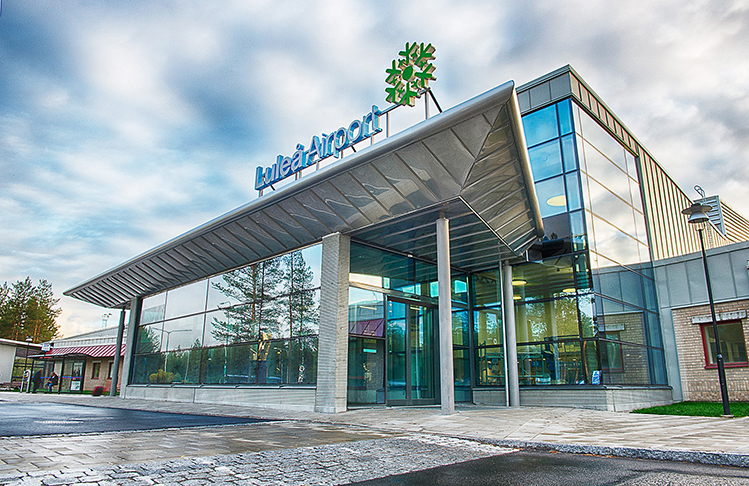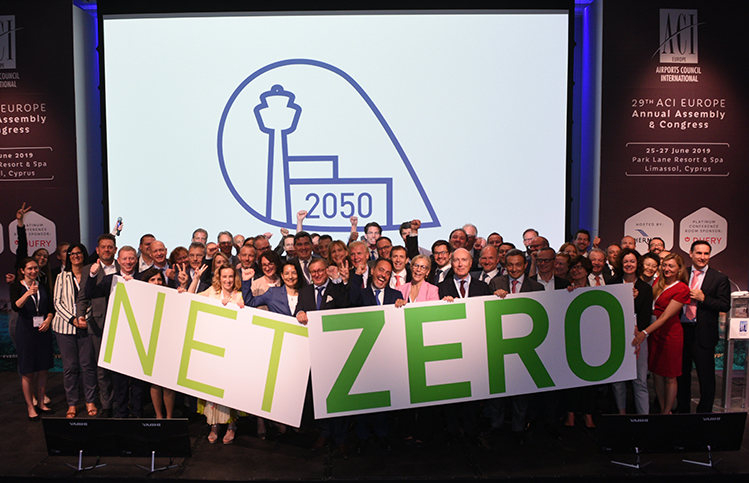The issue of climate change had significant political visibility in mid-noughties, until the economic & financial crisis pushed it from the front pages. Nevertheless, airport operators have been engaged in climate action since 2009, notably through Airport Carbon Accreditation, but in the past 5 years, climate change has gone from being about mitigation to the need to urgently address the climate emergency. So, what’s the next step? Written by Robert O’Meara & Marina Bylinsky
Since autumn 2014, the issue of climate change has gradually come back to the fore. At that time, in the space of a few months, there were marches, a much-viewed speech to the UN Assembly by movie star Leonardo DiCaprio, the release of the book “This Changes Everything” by Naomi Klein and the blockbuster movie “Interstellar”, which was set in climate-changed, resource-depleted mid-21st century USA.
Skip ahead a year later, when COP21 brought together the world’s leaders and the Paris Agreement was signed. Throughout the disruptive year of 2016, the issue garnered further attention due to the polemic positions of world leaders such as Donald Trump (who does not believe in climate change) and Emmanuel Macron, who actively courted climate change scientists to move to France, appealing to them to
‘make our planet great again’.
All of this has helped sustainability become a prominent watchword in corporate circles, but the issue of climate change received its most significant boost last year, with the publication of the IPCC (Intergovernmental Panel on Climate Change) Special Report on Global Warming of 1.5°C in October. The report spelled out the problem in very arresting terms and its release occurred at a time when various extreme weather incidents occurred across the world.

Media attention on the issue of climate change has had a growing number of story angles to pursue – the emergence of 16-year-old Swedish activist Greta Thunberg is already well-documented, as are the school protests she has motivated in over 100 countries.
Over the nine months that have passed since then, media attention on the issue has had a growing number of story angles to pursue – the emergence of 16-year-old Swedish activist Greta Thunberg is already well-documented, as are the school protests she has motivated in over 100 countries. The ‘flygskam’ or flight-shaming movement which also began in Sweden is increasingly inspiring other movements elsewhere, notably against travel bloggers and influencers. Between these actions and the implementation of a new aviation tax on flights last year in Sweden, it’s no wonder that Sweden is currently the only EU country to report loss of passenger traffic.
However, it would be a mistake to think that the situation is limited to Sweden or even Europe. Activist movements such as Extinction Rebellion and Stay Grounded have mobilised a burgeoning groundswell of public support through networks all across Europe and in other continents, all calling for meaningful action on climate change – and a shift in the way businesses respond to the issue. In April of this year, the series ‘Our Planet’ addressed the subject of climate change and its impacts on the 4 corners of the world. Narrated by Sir David Attenborough and produced by Netflix in collaboration with the WWF, it has brought the issue of climate change closer to home for millions of people.
A major report issued by the Intergovernmental Platform on Biodiversity and Ecosystem Services (IPBES) in May received extraordinary coverage that made a clear link between climate change and habitat disruption and its implications.

At the COP24 Summit in Katowice last December, Sir David Attenborough gave a speech in which he implored for more action, saying “Time is running out. The people want you, the decision makers to act now.”
Political temperature rise
Most recently, the European Parliamentary elections provided an occasion for further debate on the subject of climate change and the role of aviation. With a turnout of more than 50% of the electorate and unequivocal gains for green party groups across the bloc, society is clearly motivated about pursuing a more sustainable concept of capitalism. The run-up to the election brought with it renewed anti-aviation rhetoric, with many calling for aviation taxes and other measures to suppress demand.
These punitive solutions do little to address the actual problem – and to date, the money raised from such taxes has never been invested in environmental research or any other sorts of green projects. In its recent report “Mission Possible: Reaching net zero carbon emissions from hard-to-abate sectors by mid-century”, the Energy Transitions Commission estimated that increases in prices for air travel are unlikely to lead to more than a 9% reduction in total aviation emissions – because of the value people place on air travel, both for leisure and business purposes. Accordingly, it concluded that “progress towards significant emissions reductions will have to rely primarily on supply-side rather than demand-side measures.”
Tax – a convenient idea for some, but not the answer
While taxing aviation is thus unlikely to yield significant environmental benefits, it might have negative social consequences. At the ACI EUROPE Regional Airports conference in Krakow last month, Olivier Jankovec, Director General ACI EUROPE commented “There is no doubt that aviation collectively needs to up its game when it comes to climate action. But, while taxing aviation to curb demand looks like an easy fix for some, the reality is that it does little if anything to decarbonise air transport. In fact, it would primarily impact regional connectivity, hurting smaller communities and lower income citizens. Air routes serving smaller regional airports would be the first to be axed, as these are typically the least profitable for airlines.”
He added “Taxing aviation raises serious issues of social & territorial inequality – the very themes that are driving public debates and politics across Europe right now. Doing so would actually question the core EU objectives of fostering cohesion and economic integration. It is an unavoidable fact that these objectives rely on affordable and extensive air connectivity. The challenge of greening aviation deserves better than that. It must be addressed in an effective & inclusive manner.”
Airport climate action

The European Aviation Environmental Report 2019 concludes that emissions from European aviation have grown by 16% since 2005 and are expected to increase by another 21% by 2040. This trajectory is far away from what would be needed to achieve net zero emissions by 2050 on an economy-wide scale.
Climate action is nothing new for Europe’s airports. 174 of them are currently certified under the Airport Carbon Accreditation programme, with 40 having achieved the carbon neutrality level and 3 having even reached net-zero carbon emissions without offsetting. But more needs to be done.
The above-mentioned IPCC Special Report concluded that in order to avoid catastrophic consequences of global warming on mankind and the planet, our societies and economies need to reach net zero emissions by mid-century – meaning that any additional man-made emissions would have to be removed from the atmosphere as of 2050. Accordingly, the European Commission has also adopted the vision of a net zero emissions Europe by 2050 in its Communication A Clean Planet for all issued last November.
For ACI EUROPE, this vision means that in 2050, there will be no place for the offsetting of emissions – every sector needs to reduce them as much as possible in-house and ideally eliminate them. This is why ACI EUROPE decided to review its position on climate change, which so far has been mainly articulated around the objective of 100 carbon neutral airports by 2030. While this target remains valid, the scientific and political developments of the last months made obvious that it needs to be complemented by a more ambitious and long-term target – net zero carbon emissions airports, at the latest by 2050. This objective is part of a comprehensive ACI EUROPE Sustainability Strategy, released at the ACI EUROPE Annual Congress on 26 June.
This commitment will not only require more efforts to be achieved than carbon neutrality, because any residual emissions can only be addressed through carbon capture, not offsetting, it also engages more airports – as a matter of fact, the whole ACI EUROPE membership of 500 airports. As ACI EUROPE announces this commitment, nearly 50 airport operators, managing close to 200 European airports have already undersigned it. Ensuring the buy-in to this commitment from such a diverse group of airports was not an easy task and required extensive research and analysis on the technological, economic and political conditions of the decarbonisation of airport operations.
This analysis has confirmed that reaching net zero emissions by 2050 will be both technically feasible and financially affordable, for different types of airports located in various European countries.
Based on the total number of passengers in 2018 (2.34 billion), the industry’s Net Zero commitment will eliminate total annual emissions to 3.46 million tonnes of CO2 in 2050.
Vision 2050
But you may wonder, isn’t 2050 too far away? Doesn’t it allow the industry to wait for decades before stepping up its climate action? No, it does not. Airport infrastructure is designed for the long-term and investment decisions made today need to take account of the decarbonisation goal, otherwise an airport operator will simply fail to reach net zero emissions by 2050. Furthermore, a shorter timeline would have compromised the buy-in from some airports, and thus the engagement of the whole airport community. That being said, ACI EUROPE strongly encourages airports to achieve net zero emissions prior to 2050. Three of Swedavia’s airports have already achieved this goal, and the whole group is set to follow this example by 2020. Schiphol and Copenhagen Airports aim for net zero by 2030 already.

ACI EUROPE strongly encourages airports to achieve net zero emissions prior to 2050. Three of Swedavia’s airports, including Luleå Airport (pictured), have already achieved this goal, and the whole group is set to follow this example by 2020.
So all of that looks great – if there was not a significant BUT… Emissions under airport operator’s control account for 2-5% of the total emissions from aviation. The European Aviation Environmental Report 2019 concludes that emissions from European aviation have grown by 16% since 2005 and are expected to increase by another 21% by 2040. This trajectory is far away from what would be needed to achieve net zero emissions by 2050 on an economy-wide scale.
While recognising that decarbonising aircraft operations is particularly challenging, it was therefore important for ACI EUROPE, as part of our new position on climate change, to also call the whole aviation industry and ICAO to work on a vision and roadmap towards net zero aviation. With climate change being an existential threat, we believe that there is simply no alternative than performing this difficult and challenging task. European airports are committed to support this process.
At the COP24 Summit in Katowice last December, Sir David Attenborough gave a speech in which he implored for more action, saying “Time is running out. The people want you, the decision makers to act now. To help make change hap-pen, the UN has launched the Act Now campaign to help people to discover simple everyday actions that they can take, because they recognise that they too must play their part. Leaders of the world, you must lead. The continuation of our civilisations and the natural world upon which we depend, is in your hands.”
If your local community or your national government has not already asked about your climate change position and your climate resilience contingencies, it will only be a matter of time.

The comprehensive ACI EUROPE Sustainability Strategy was released at the ACI EUROPE Annual Congress on 26 June. Separately, the European airport industry committed to achieve net zero carbon emissions for the carbon emissions under their direct control, by 2050 at the latest. To affirm their commitment, 194 airports run by 40 airport operators have undersigned the pledge.







